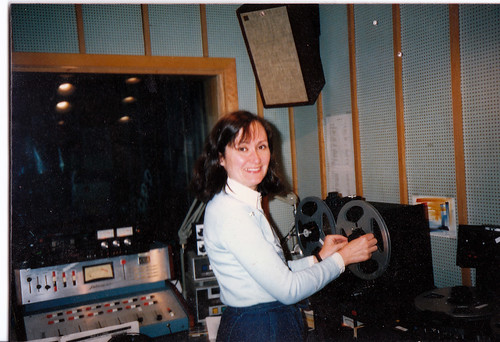 |
| Laura producing "For the Birds" in the KUMD studios sometime in the late 80s. |
My hearing has been going south for quite a while—apparently even longer than I’ve realized. For a while, Russ and I have been joking how we each mis-hear words the other one is saying, sometimes with funny results but usually just making us confused. My daughter and I have driven between Duluth and New York City on a few occasions, and, until I finally got hearing aids, it was getting increasingly frustrating for her when I’d constantly ask “What?” Somehow the car noise, even from a relatively quiet Prius, made understanding her very difficult unless I could stare at her mouth, which never works when you're driving.
As it turns out, there have been more people dealing with the problems of my hearing loss than I imagined. I never hear what my radio and podcast listeners say about me, but by definition, those listeners can hear me, and have been putting up with poor sound mixing between my voice and the bird songs I use, apparently for years. I now realize I've been making the bird recordings too loud, relative to my voice. I’m sure some of the on-air people at radio stations adjust the sound levels as they play "For the Birds" on air, or maybe even tweak the digital sound files, but no one has ever mentioned any of this to me until intrepid and kind podcast listener Janna Pauser sent me this email on March 16:
I enjoy your podcasts and use earbuds to listen to them one after the other. I treasure my good hearing and keep the volume as low as possible to hear your voice. However the volume of the bird song at the beginning and end of each episode is so much louder than your voice its uncomfortable. I fell asleep while listening For the Birds last night and woke up from the bird song portion even though I was sleeping on the earbud. Could you please balance the volume?When I started producing "For the Birds" in 1986, I recorded my voice on an open-reel tape and then mixed in the bird sounds, originally from my old vinyl records and later from CDs. I’d use the needle on the KUMD studio board to get the balance right for both. Around 2000, I started producing digitally, using a program called Cool Edit, which became Adobe Soundbooth and then Adobe Audition. I’d process my original voice recording to “normalize” the volume to a particular level, and then I’d mix in the bird sounds to make them sound right to me. But now two unfortunate issues came into play. First, I like hearing bird sounds a lot, so don't mind them being loud relative to other sounds, especially my voice. But second, I’m not hearing those bird sounds as well as I used to, which means I’ve had an even stronger tendency to put them in at a louder volume than my voice. Yet for lo these many years, not one person has mentioned this to me, but when I asked Lisa Johnson, who plays the program on KUMD most mornings, she said yep—I do that.
I think the reason the stations never told me about this problem is they know I can’t afford to consult with or hire a professional audio engineer, or take a class in sound mixing. I’ve been producing For the Birds for almost 31 years, all but one of those years as an unpaid volunteer. I cover all my own costs for production, distribution, and my radio website on what is usually a very meager annual income—the stations carrying the program may have not wanted to criticize me without providing me with a simple fix. But I do need to find that fix. If I’m going to put the program out there for radio stations to air and podcast listeners to download, I have no right to play Star Trek’s McCoy whining, “Dammit, Jim, I’m a birdwatcher, not an audio engineer!”
So in the coming weeks, I’m going to tweak my production methods to try to achieve a better balance between the bird songs and my voice. The trick is, my ears have a poor track record in recognizing if I’m doing it right—only listeners can do that. Janna has graciously agreed to let me know how new programs sound to her, but I’d also love to hear from other listeners if you notice an improvement in the audio, or if you don't. Janna’s helpful email has prodded me to prove once and for all that an old dog, even one who’s losing her hearing, can learn at least one new trick.